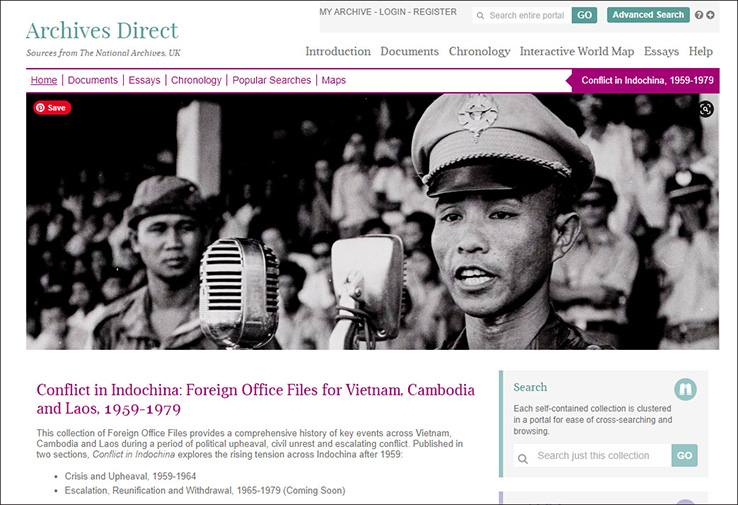Conflict in Indochina: Foreign Office Files for Vietnam, Laos, and Cambodia, 1959–1964 | eReview
AM’s most recent archive is the first in a planned two-module collection that highlights the political, social, and cultural upheaval in Laos, Cambodia, and Vietnam.
Conflict in Indochina: Foreign Office Files for Vietnam, Laos and Cambodia: Section 1: Crisis and Upheaval, 1959–1964
CONTENT AM’s most recent archive is the first in a planned two-module collection covering the war in Vietnam, including an examination of how the escalating conflict crossed borders and affected the neighboring countries of Laos and Cambodia. The first section, “Crisis and Upheaval,” covering the years between 1959 and 1964, is available now and is the focus of this review; the second section, “Escalation, Reunification and Withdrawal,” spans 1965–1979 and is expected later this year.
“Conflict in Indochina” draws upon files from the UK’s National Archives and includes reports, correspondence, maps, photographs, newspaper clippings, economic data, and memoranda. These documents provide unique insight into the broader ramifications of the conflict, including intervention from China and the Soviet Union, Anglo-American relations, religious tensions and confrontations, commercial relations, and cultural differences within the regions. Additionally, these files illuminate the British government’s approach to foreign policy, balancing its wishes to ally with the U.S. and oppose the spread of communism, while encouraging de-escalation to protect British interests.
USABILITY The homepage is attractive, with judicious use of color, fonts, and images. A top navigation menu provides access to different types of content, including primary documents, a chronology tool, an interactive world map, and essays written by international scholars and experts in the field. While the top navigation bar is intuitive and responsive, users may be confused by a second top navigation bar, which adds popular searches and maps into the mix but is otherwise nearly identical to the first. Closer inspection reveals that this navigation bar applies specifically to Conflict in Indochina, while the uppermost navigation bar provides access to the entire suite of Archives Direct materials (full access depends on which modules the institution has purchased).
Users will find search functions at the top of the page. These include a prominently located search bar and advanced options. Advanced search allows users to filter by date, collection, region, and department/office (such as Foreign Office for Southeast Asia files). Popular search lists are also available, supplying users with a springboard for further exploration. Returned results include each document’s date, collection, region, and originating department. A linked list of related topics allows researchers to broaden searches or delve more deeply into their selected topic. Images are displayed with thumbnail links; when selected, each one opens the full document with search terms highlighted. Users can easily enlarge or reduce images and download entire documents or image ranges.
AM also allows researchers to save searches, slideshows, and documents to a personal archive for later reference.
PRICING Cost is determined by a range of factors that influence the size of the potential user group, including but not limited to Carnegie Classification and full-time enrollment. Contact info@amdigital.co.uk for more about pricing.
VERDICT This first installment in AM’s “Conflict in Indochina” offers a unique perspective on the broader impact of the Vietnam War, highlighting the political, social, and cultural upheaval in Laos, Cambodia, and Vietnam. AM’s robust search tools provide seamless access to the content and allow researchers to deepen their knowledge of this tumultuous time in history.
RELATED
ALREADY A SUBSCRIBER? LOG IN
We are currently offering this content for free. Sign up now to activate your personal profile, where you can save articles for future viewing










Add Comment :-
Comment Policy:
Comment should not be empty !!!